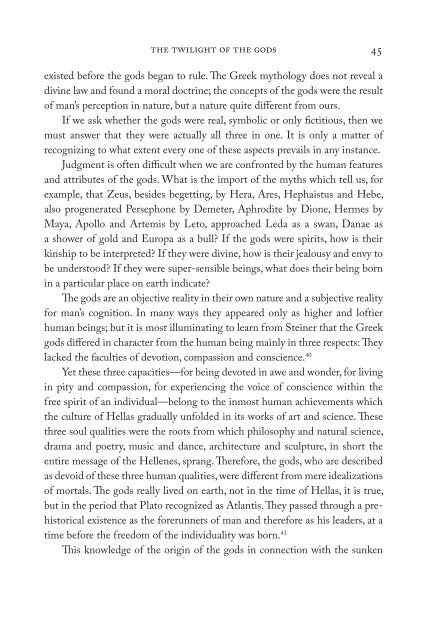The Gospel of Hellas - Research Institute for Waldorf Education
The Gospel of Hellas - Research Institute for Waldorf Education
The Gospel of Hellas - Research Institute for Waldorf Education
Create successful ePaper yourself
Turn your PDF publications into a flip-book with our unique Google optimized e-Paper software.
the twilight <strong>of</strong> the gods<br />
existed be<strong>for</strong>e the gods began to rule. <strong>The</strong> Greek mythology does not reveal a<br />
divine law and found a moral doctrine; the concepts <strong>of</strong> the gods were the result<br />
<strong>of</strong> man’s perception in nature, but a nature quite different from ours.<br />
If we ask whether the gods were real, symbolic or only fictitious, then we<br />
must answer that they were actually all three in one. It is only a matter <strong>of</strong><br />
recognizing to what extent every one <strong>of</strong> these aspects prevails in any instance.<br />
Judgment is <strong>of</strong>ten difficult when we are confronted by the human features<br />
and attributes <strong>of</strong> the gods. What is the import <strong>of</strong> the myths which tell us, <strong>for</strong><br />
example, that Zeus, besides begetting, by Hera, Ares, Hephaistus and Hebe,<br />
also progenerated Persephone by Demeter, Aphrodite by Dione, Hermes by<br />
Maya, Apollo and Artemis by Leto, approached Leda as a swan, Danae as<br />
a shower <strong>of</strong> gold and Europa as a bull? If the gods were spirits, how is their<br />
kinship to be interpreted? If they were divine, how is their jealousy and envy to<br />
be understood? If they were super-sensible beings, what does their being born<br />
in a particular place on earth indicate?<br />
<strong>The</strong> gods are an objective reality in their own nature and a subjective reality<br />
<strong>for</strong> man’s cognition. In many ways they appeared only as higher and l<strong>of</strong>tier<br />
human beings; but it is most illuminating to learn from Steiner that the Greek<br />
gods differed in character from the human being mainly in three respects: <strong>The</strong>y<br />
lacked the faculties <strong>of</strong> devotion, compassion and conscience. 40<br />
Yet these three capacities—<strong>for</strong> being devoted in awe and wonder, <strong>for</strong> living<br />
in pity and compassion, <strong>for</strong> experiencing the voice <strong>of</strong> conscience within the<br />
free spirit <strong>of</strong> an individual—belong to the inmost human achievements which<br />
the culture <strong>of</strong> <strong>Hellas</strong> gradually unfolded in its works <strong>of</strong> art and science. <strong>The</strong>se<br />
three soul qualities were the roots from which philosophy and natural science,<br />
drama and poetry, music and dance, architecture and sculpture, in short the<br />
entire message <strong>of</strong> the Hellenes, sprang. <strong>The</strong>re<strong>for</strong>e, the gods, who are described<br />
as devoid <strong>of</strong> these three human qualities, were different from mere idealizations<br />
<strong>of</strong> mortals. <strong>The</strong> gods really lived on earth, not in the time <strong>of</strong> <strong>Hellas</strong>, it is true,<br />
but in the period that Plato recognized as Atlantis. <strong>The</strong>y passed through a prehistorical<br />
existence as the <strong>for</strong>erunners <strong>of</strong> man and there<strong>for</strong>e as his leaders, at a<br />
time be<strong>for</strong>e the freedom <strong>of</strong> the individuality was born. 41<br />
This knowledge <strong>of</strong> the origin <strong>of</strong> the gods in connection with the sunken

















